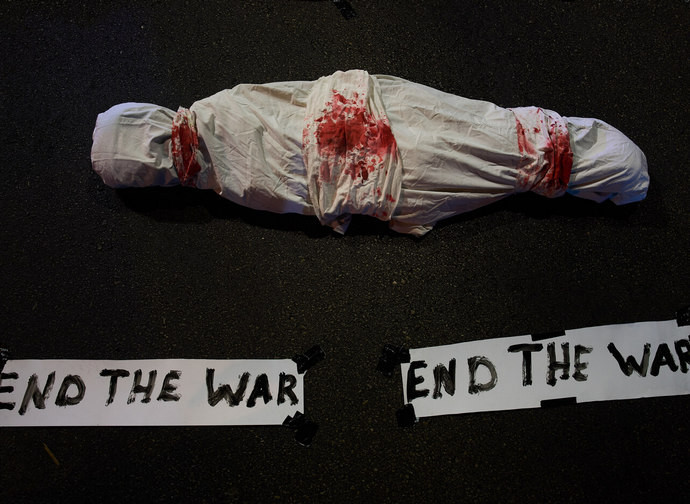Remembering 7 October 2023 helps to build peace
The second anniversary of Hamas' terrorist incursion into Israeli territory, resulting in 1,200 deaths and 250 hostages, reveals the extreme partisan nature with which we view the deaths on either side. Instead, the Church calls us to take an approach that recognises the humanity in each individual.

7 October is set to become a date as symbolic as it is divisive. For some, it is Islamic Resistance Day, as a banner at the pro-Palestine demonstration in Rome a few days ago read. For others, it is a new Holocaust Remembrance Day: a commemoration of an unprecedented massacre and an expression of anti-Jewish hatred.
On that day in 2023, the world certainly witnessed a large-scale terrorist operation, with more than two thousand Hamas and other Palestinian militia members raiding Israeli territory from the Gaza Strip. They took the security forces by surprise, killing 1,200 soldiers and civilians, including women, children, and the elderly. They also took about 250 hostages to Gaza.
This massacre, which Vatican Secretary of State Cardinal Pietro Parolin on Monday 6 October described as 'undignified and inhuman' in an interview with Vatican News, was certainly not unexpected. It is the result of a decades-long conflict that has multiplied mutual hatred, as well as the sabotage that occurs in the region whenever a peace agreement seems likely.
On this occasion, the formalisation of an agreement between Israel and Saudi Arabia was imminent, representing a decisive step towards the complete success of the Abraham Accords Peace Agreement — the initiative devised by former US President Donald Trump during his first term — which aimed to establish an area of peaceful cooperation in the Middle East by isolating the common enemy, Iran, through mutual recognition between Israel and Sunni Arab countries.
10 July also marked a quantum leap in the Israeli-Palestinian conflict. There had never before been an invasion of Israeli territory, although the security forces' unpreparedness remains to be explained. Nor had there ever been such a display of brutality and ferocity on such a large scale, filmed by the triumphant protagonists themselves.
Hamas knew very well what Israel's reaction would be and was counting on it to some extent, as the brutality of the Israeli response would provoke international public opinion and isolate the Jewish state. This actually happened, but to a certain extent. The Palestinian terrorist groups probably did not expect the magnitude and violence of the Israeli operation. As Cardinal Parolin said: 'I am struck and grieved by the daily death toll in Palestine: dozens, sometimes hundreds a day. So many children, whose only crime seems to be being born there. We risk becoming accustomed to this carnage!
The point is that we are becoming desensitised to the carnage, but not only that: we are using the respective massacres for political ends. The victims on either side are merely being paraded to further their own agenda. We are seeing this in many counties and particularly in Italy these days: the war crimes committed by the Israeli army in Gaza over the past two years are being used to legitimise the 7 October massacres and any other terrorist act. The slogans shouted at Gaza demonstrations speak volumes, as do the recent appearances of Francesca Albanese, the UN rapporteur on Palestine. First, she silenced the mayor of Reggio Emilia for condemning the 7 October incursion. Then, she left a La7 television studio during a programme just because another guest quoted Liliana Segre. Today, she is scheduled to appear at a Gaza conference in Genoa organised by various groups, including Anpi and Amnesty International. The aim is clearly to erase 7 October from memory or to reinterpret it as an act of resistance. Furthermore, there should be at least some intellectual honesty in remembering that those leading the pro-Palestine movement today were also criticising Israel on 7 October 2023.
Conversely, it is precisely the Israeli government that continues to exploit 7 October to justify the current bloodshed in Gaza and its expansionist policies under the guise of security. So far, the only result has been an increased number of innocent victims and further fuelling of the spiral of hatred that poisons the Middle East and beyond.
There is a double standard in the way victims are commemorated: some people only show images of Gaza, while others only consider the Israeli victims of 7 October.
On this anniversary, when there is a glimmer of hope that the fighting might cease, we should instead reflect on the harrowing images of victims of the terrorist attack alongside those of civilians killed or displaced in Gaza.
We should reflect on how absurd it is to think that war can solve problems when it only sows death and suffering, making a stable and lasting solution more difficult. As Cardinal Pierbattista Pizzaballa, the Latin Patriarch of Jerusalem, wrote in his letter for today's anniversary, 'Even if the war were to end now, all this and much more would still constitute a human tragedy that would require a great deal of time and energy to recover from.' The end of the war does not necessarily mark the beginning of peace. But it is the first indispensable step to start building it'.
While political and diplomatic initiatives are important, nothing lasting can truly be achieved if we do not rise above a sectarian mindset and adopt a perspective capable of embracing 'that feeling of humanity that survives in the heart of each one', despite the power of evil and death, as Cardinal Pizzaballa said.
This is why Pope Francis's invitation to pray the rosary for peace every day in October is so pertinent. It is an invitation that we therefore make our own.
